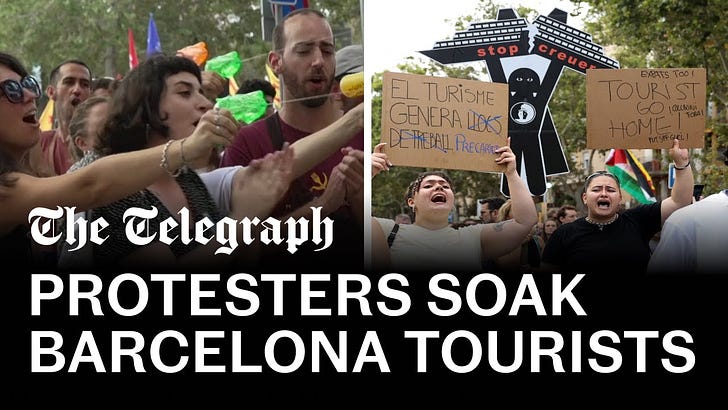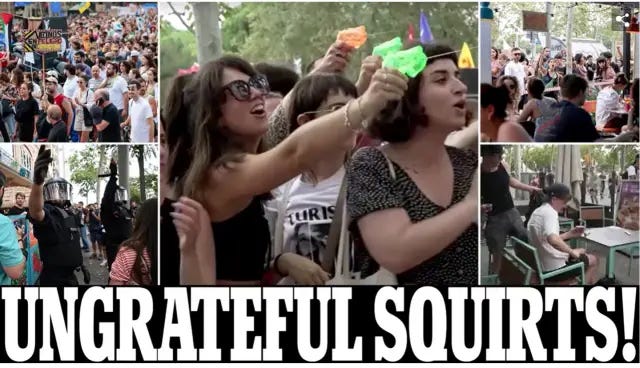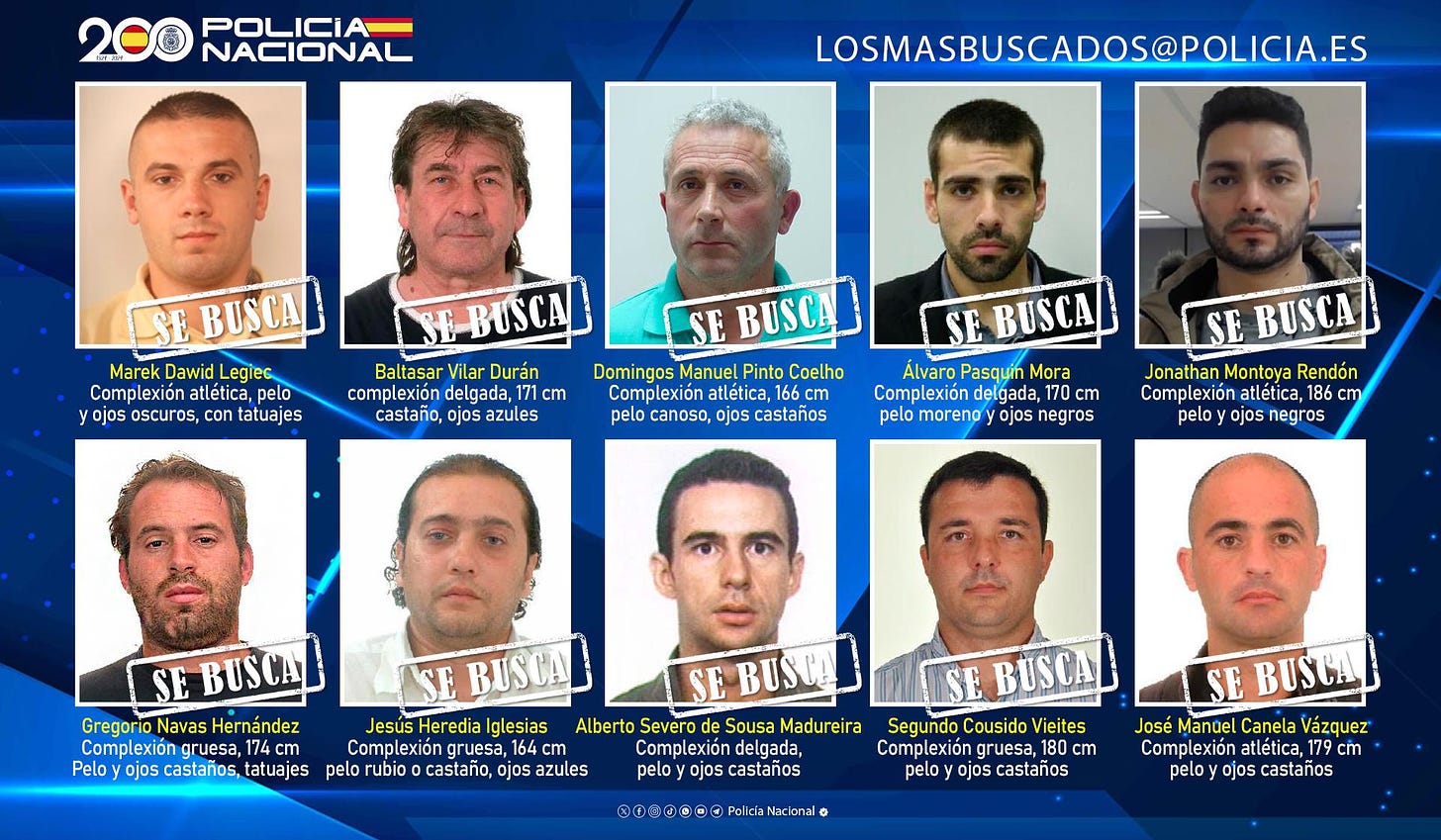🔫 This Week in Spain: Tourists Go Home! (This Time We Mean It)
Also Nacho Cano allegedly did something bad, Spain's Top 10 most wanted, and li'l baby Yamal.
By @IanMount and @AdrianBono | July 11, 2024 | Madrid | Issue #65
🎉 Welcome to The Tapa, an English-language, weekly newsletter about all things Spain!
🥜 This Week in a Nutshell: We’ve reached that time of the year when we really need to start digging in order to find content that is newsworthy. Yes, Pedro Sánchez’s wife and now his brother seem to be dealing with legal troubles but since it could all turn out to be a nothing burger we’re passing on covering those until there’s something worth mentioning. In the meantime, you’re stuck with the stories about football, Vox and drunk people on planes. It’ll be September soon, don’t worry.
🙏 Remember that if this email gets truncated at the bottom because it’s too long, just click here to read the rest on Substack.
🙌 One more thing: Remember we are offering paid subscriptions, and we’d be thrilled if you purchased one to help build this enterprise we’ve had so much fun creating. (And to those of you who have already subscribed, thanks for the love 🥰.)
🕺If you haven’t subscribed yet, please do so by clicking on the button below.
🫶 And if you already have, please send this newsletter around to your friends and family and help us keep growing.
Rolling up the welcome mat
🩴 Barcelona Is Soaking Tourists—Literally
Sun, sand and people telling you to get the hell out. The last day of the school year not only inaugurates the summer and the floss of tourists that comes with it—it also unleashes the irritation of invaded locals and, this year, their protests against the invading hordes.
Really, we want you to go home. The protest against over-tourism in central Barcelona last Saturday was far from the largest Spain has seen—its 2,800 according to the police/20,000 according to organizers (because…protest counts are always like that) pale in comparison to the 50,000 who protested in the Canary Islands in April—but the protest in Catalonia’s capital marked a turning point.
Because the protestors “attacked” tourists, sorta. We put “attacked” in scare quotes because there was no actual violence, but protestors “locked in” tourist restaurants with police tape, yelled at tourists to go home, suggested they go “balconing” (i.e. die by jumping between hotel balconies while on vacation) and sprayed them with water pistols.
This converted the protests into a “British press issue”. Because the London tabloids like nothing better than taking offense. One Daily Mail headline says it all: “Families cower in Barcelona restaurants as they are targeted by baying anti-tourist mob who spray them with water pistols and hold up signs mocking Brits who fall to their deaths from hotel balconies”. Which is not at all exaggerated 🤣.
Just the facts, ma’am. To state the glaringly obvious, tourism is a massive—and growing—business in Spain. Spain is the world’s second most touristed country (after France), with 85.1m foreign visitors in 2023. That’s 18.7% more than in 2022, according to the INE national stats bureau. And the most visited region? You guessed it: Catalonia, with 18m, followed by the Balearic Islands (14.4m) and the Canary Islands (13.9m).
So you expected a break in 2024? No luck there. Through the first five months of the year, visitor numbers are up 13.6%, to 33.2m; in Catalonia they’re up 13.1%, to 7.1m.
How do you say that in €? Foreign tourists spent €108.7bn during 2023, which is 24.7% more than in 2022—and 18.2% more than in the pre-pandemic year of 2019. This is more than just a bounce back. Tourism accounted for 12.8% of Spanish GDP in 2023, which is a record (and one that protestors were prolly not happy to set, right?).
What does it all mean? Unless Spain suddenly develops ugly beaches and shit weather, these numbers are (in our expert opinion 🤔) destined to rise and rise. And, obvs, this will cause more problems with locals cheesed off by overcrowded city centers, the death of local stores, and—most of all—rising housing costs.
Barcelona is already scrambling. As we reported, Barcelona Mayor Jaume Collboni (PSC) announced back in June that as of 2029, there would be no more tourist flats in the city. All 10,101 legal tourist apartments in the Catalan capital will see their licenses extinguished in November 2028.
Why so tough, BCN? Rent has risen 68% over the last decade and buying prices have gone up 38%, Collboni said. And it’s not just Barcelona: Cities from Lisbon to Berlin to the Canary Islands have been cracking down on short-term rentals. Even Málaga, a PP-governed city seen as friendly to the real estate business, has put a moratorium on new licenses.
Finally, a funny bit. If protests in Spain—and English tabloids—can be counted on for one thing, it’s funny slogans, and the Barcelona drama was no exception. Beyond the usual “Tourist go home! (Expats too!)” and “Barcelona is not for sale”, protesters offered the now-classic “Dear tourist: Balconing is fun!” and our favorite: “Less ‘brunch’ and more barrio’”. From the British corner, the Daily Mail replied with the (not entirely untrue) observation that tourists drop a lot of 💶 in Barcelona—El País says tourism employs 150,000 people in the city—and thus maybe locals of the Catalan capital should take a chill pill. The image says it all.
More news below. 👇👇
🔔 But First, A Message From Our Sponsor
Bucólico Café is a project of connection that was born as a specialty coffee shop.
We value time and understand that it represents both a cycle and an instant—chronology and nostalgia. Bucólico is a space that connects one’s soul with the purity, lightness and beauty of the countryside—while being in the city. Via a cup of coffee, a piece of cake or a song…
Located on Calle de Barbieri 4 — a few blocks from Plaza Chueca — Bucólico reassures the soul with a feeling of home.
Follow Bucólico Café on Instagram.
💬 Five things to discuss at dinner parties this week
1. Musical producer Nacho Cano arrested for allegedly hiring undocumented immigrants
Remember Nacho Cano? He was in the highly popular 80s pop band Mecano.
Rings a bell? No? How about their hit song, Hija de la Luna? Still nothing?
Anyway, Cano is now a successful composer and musical producer whose recent stage musical Malinche premiered in Madrid in 2022 to much acclaim (and even a Netflix documentary). And now guess what? He was also arrested on Tuesday (and moments later released) along with one of his colleagues for allegedly making a group of Mexican artists work on his musical without the necessary work contracts.
Seventeen. The police claims that 17 Mexican artists, who were a part of the Malinche cast, are in Spain without authorization because they had their study permits denied last May. Whoops! 🙀
Cano disagrees. He insists that they are not a part of the cast but students (feel like we’ve heard that before) participating in a privately funded scholarship program that trains the group in Spain so they can rehearse and later be part of the same show when it premieres in Mexico.
The investigation started back in January, El País reports, when one of the young Mexican dancers filed a complaint at the police station in Madrid (she would later leave the show).
Living rough. She complained about their living conditions. As in, according to the police report, they were putting four people in a hostel room, and were given only €10 to eat per day, a weekly allowance of €20 and a monthly salary of €300 that was later increased to €500. As they rehearsed six days a week, they were allegedly given the option to make more money waiting tables at a bar right outside where the musical was taking place. (Isn’t that nice.)
Investigators say the artists arrived in Spain in December “on scholarships with internship programs” but were instructed “to pretend to be tourists” after landing, to make it sound “like they would return within the allowed” 90 days. Cano’s lawyer explained that after two months in Madrid, the producers tried to get them all student visas but the request was denied in May (they weren’t applying to study in an accredited institution) so they were told the students had to leave the country immediately.
Don’t tell them. The police further claim that the artists were never told of this and continued to work on the show “despite their irregular status”. Denying all of this, Cano’s lawyer says they took the case to the Government Delegation in Madrid but still haven’t received a response because it’s busy and stuff.
Things took a turn for the weird when, on Tuesday, Cano decided to offer a press conference (see above) to defend his situation, insisting that they were not “illegal workers but students participating in a private scholarship”… that’s also an internship. Kind of.
Then he decided to say that this whole thing was happening because he’s friends with Madrid regional president Isabel Díaz Ayuso and that “it’s the police that has to be investigated”.
She’s dangerous to The Man! “My proximity to Díaz Ayuso is the key to everything… they’ve gone after her whole family and I was the only one left. If you find me dead in a gutter, you know who it was,” he said (and no, we don’t).
And now, the East German secret police. “All this has been orchestrated by the police. It’s like the Stasi. It’s a dirty and disgusting operation,” he said. Then he added that this was being done to distract people from the legal issues around PM Sánchez’s wife Begoña Gómez (without presenting evidence, natch).
But there’s more! If you thought Ayuso would try to stay away from this, you would be (obviously) wrong.
This could be a new musical. Yesterday, she said that Cano’s arrest was done in order to “destroy him personally for political goals” and it was “simply Stalinism”. Her spokesperson, Miguel Angel García Martín, also agreed with Cano’s theory that this was done to take people’s attention away from Gómez.
PM Sánchez’s Government Delegate in Madrid, Francisco Martín Aguirre criticized Ayuso on Twitter, saying it was of an “extreme institutional irresponsibility” to sow doubt over the work of the security forces.
Cano is now expected to testify in court soon but there’s definitely more to this story than meets the eye. Stay tuned.
2. 🧒 What’s all the drama about MENAs? And what’s a MENA anyway?
You could be excused for ignoring Vox’s recent threats to the PP. Spain’s center-right PP and the far right party it uses as a crutch to get to a majority—as it has done in five autonomous communities—bicker constantly because Vox often tries to do things that sound crazy to the rest of the right (and the world), like return to the 15th century or force all children to study bullfighting (these are jokes, people, but not that far off base). But the current fracas between the two concerns something serious: MENAs. As in, Vox says the PP has “broken” the agreements that support their five coalition governments by accepting more MENAs. Scary! 😱
Please define MENAs. MENA is an official term that first appeared in Spain's official BOE state gazette in 2009, and it’s an acronym for Menores Extranjeros No Acompañados, or Unaccompanied Foreign Minors. Basically, they are kids who come to Spain via undocumented immigration (over the fences at Ceuta or Melilla or via boat to the Canary Islands).
Who are they? At the end of 2023, there were 15,045 people between 16 and 23 classified as MENAs or former MENAs who aged out (being that that number doesn’t include those under 16, there are likely a bunch more). Of those, 94% are male, and 67% are Moroccan nationals.
Why is this in the news now? Because, quite simply, there are more of them. According to Reuters, 56,852 migrants illegally entered Spain by land or sea in 2023, 82% more than in 2022 and most since 2018. The Canary Islands received the lion’s share—39,910—a 154% jump over 2022, surpassing the previous record of 31,678 set in 2006.
The current issue is sharing MENAs. Right now, the Canary Islands is saturated, with close to 6,000 MENAs in various residences and centers. The central and regional governments have been negotiating an arrangement where Spain’s autonomous communities agree to take some of them. The five communities headed by the PP of Alberto Nuñez Feijóo voted for an agreement to take 347 of them (209 would go to PP-led regions). Not enough to really ease the pressure on the Canaries, but hey, it’s something.
It might seem like a small number, but… These 347 kids have driven Vox and its boss Santiago Abascal completely bananas. In a statement put out Wednesday night, he accused Feijóo of “forcing” the PP’s regional leaders to take the kids, thereby “breaking” the five regional governing pacts because of his “obsession with kneeling down before Sánchez.” Zoinks! 🫢
Saying the quiet bit out loud. Much of Vox’s electoral platform can be summarized as “Muslim immigrants are terrible because they destroy our culture and commit crimes”. (In a recent stunt, a Vox pol in Catalonia read out a list of first names of people recently arrested to try to show that people with Muslim names were heavily represented.) In Wednesday’s statement, they got to the point: “VOX is not going to be complicit in rapes, robberies and machete attacks.”
So what’s next? That’s a fantastic question. Vox is holding an “emergency meeting” today, and if they decide to leave the coalition governments, the PP will have to govern alone while making one-off agreements to pass measures, or hold early elections.
The MENA deal as it stands will pay regions a little more than €100/day (plus bonuses for “effort”) for each MENA they accept (which also angers Vox—money of all taxpayers and such). In the past, the autonomous communities have not always taken all the kids they promised—in 2022, Galicia and Andalucia took basically all they said, while Catalonia took in 20 of 40 and Madrid 10 of 30 promised.
The central government wants to set up a mandatory reception/asylum system for MENAs (it’s currently voluntary) but this requires support from the PP and, with regional governments not eager to give up power, this may will be tough.
3. 🔎 Spain’s Top 10 Most Wanted
The Policía Nacional published its Top 10 Most Wanted list this week, and it’s pretty much a profile in miniature of crime in Spain. It’s not the first time the national police have published such a list—both the Policía Nacional and Europe’s Europol have put out such lists in the past, and the list published last May (2023) by the Interior Ministry (which oversees the Policía Nacional) ended with the capture of half of them, according to El País.
So who are these dudes (and they are all dudes)? There are three drug traffickers, one rapist, a hitman, two child molesters, a pair of murderers, and a car thief. Four are dubbed “dangerous” or “very dangerous” (though we’d suspect that when cornered they would all be).
For example… There’s a 50-year-old Huelva hashish boss (José Manuel Canela Vázquez); a religion teacher who received a 32-year sentence for child abuse (Segundo Cousido Vieites); a Colombian hitman who supervised the murder of the (also Colombian) crime boss Leónidas Vargas while he was hospitalized in Hospital 12 de Octubre in Madrid (Jonathan Montoya Rendón); and a 67-year-old drug trafficker named Baltasar Vilar Durán who is memorable for his very large ears and nose (seriously).
Ah, the post office. Back in the day, one of the most exciting bits about visiting the post office in the U.S. was the FBI’s Top 10 fugitive list that was always posted there. Being that post offices are not much of a thing anymore, maybe in Spain they could be posted on… cans of Mahou? Like the old “MISSING” kid pictures on milk cartons.
4. 🤡 Another ‘disruptive’ passenger flies RyanAir to Spanish sun and sand
(Look, it’s a slow news month, OK? We either talk about the weather or about drunk people doing dumb things. And in this case, it’s the latter.)
You say “disruptive”, we say “drunk”: You know the summer is finally here when “disruptive” (i.e. drunk) passengers get rowdy in a Ryanair flight from/to Spain. And this is exactly what happened a few days ago on a flight from Liverpool to Tenerife, in the Canary Islands, that ended being rerouted to Santiago de Compostela because of how “disruptive” one dude was.
Not surprised. As ABC bluntly puts it, “those familiar with the U.K. aviation industry are not surprised by such incidents”. British travelers heading to Spanish holiday destinations often board flights in a state that would not be, um, acceptable in airports in other countries.
That’s what happened with RyanAir flight FR4346 , which took off on July 4 and needed an emergency landing in Santiago de Compostela after a passenger was way out of control. (If you look at that TikTok video, it’s funny how people near the action behave more like engaged spectators than terrified passengers).
Witnesses captured the footage showing an aggressive man, dressed in a black shirt, striking a flight attendant who tried to stop him from opening the overhead compartments. So naturally, another passenger repeatedly punched the “disruptive” man in the face, while four others helped to subdue him. It’s all very normal.
Other videos show the man already restrained on the floor (check the ABC link we shared), while crew members use a seatbelt to hogtie him. It’s like being in a Steven Seagal movie! (We guess now it would be Gerald Butler or one of those.)
After landing in Santiago the guy was taken to a hospital (never mess with a flight attendant) and discharged the next day. Apparently he chose to go back to England rather than continue his vacation.
Charges? The whole incident cause a five-hour delay and authorities will now decide whether they want to press charges against the passenger as there were physical and economic damages (and a lot of angry passengers).
Maybe say ‘you can’t board’? Considering this isn’t the first time someone from Liverpool flying to a Spanish island has caused a ruckus, maybe it’s time for boarding controls to be less lenient, ya know?
5. 🛁 The incredible story behind that photo of Messi and a baby Lamine Yamal
Those were the days. Seventeen years ago, photographer Joan Monfort took a series of pictures for a charity calendar featuring then-Barcelona player Lionel Messi and a random baby.
Turns out that the baby, Lamine Yamal, has emerged as one of football's most promising young talents, drawing inevitable comparisons to Messi himself. And he’s the new superstar in the Spanish football team (did you see that goal when playing against France the other day?).
Charitable photo. Back in December 2007, Lionel Messi, then a rising star at Barcelona, took part in a photoshoot organized by the club's foundation and the Catalan newspaper Diario Sport. They were looking to raise funds for charitable causes, including UNICEF and local NGOs, so players were photographed alongside children for a 2008 charity calendar.
Awwww… 👶🏾 Among the many photos taken, one features a 20-year-old Messi holding a six-month-old Lamine Yamal. The shoot took place in the visitors' locker room at Barcelona's Camp Nou, and captured several moments that can now be considered surreal: Messi cradling a baby Yamal in a towel, and Yamal's mother, Sheila Ebana, helping wash her son in a small blue bathtub.
Proud dad. The photos resurfaced recently when Yamal’s father, Mounir Nasraoui, posted one of them on Instagram with the caption: "The beginning of two legends." The post immediately went viral, drawing attention to the unbelievable and unlikely trajectories of the two people in the picture.
Lamine Yamal, now 16, has already begun to carve out his legacy in football and is following in Messi's footsteps at Barcelona. Yamal has set records as Spain's youngest ever player and the youngest to compete in a European Championship during Euro 2024 in Germany.
Yamal’s crazy performance, including a stunning goal in the game that took Spain to a 2-1 victory over France and into the Euro 2024 final, has already proven his status as a future star.
These photos are now a international symbol of the early stages of these two incredible players.
🙏 Before you go, please remember to share this newsletter with your friends on social media. The more we grow, the more information we’ll be able to offer each week.








